Unit Spotlights
The following gallery features a number of unit spotlights sharing stories of progress from among the 50 unit DEI Strategic Plans.
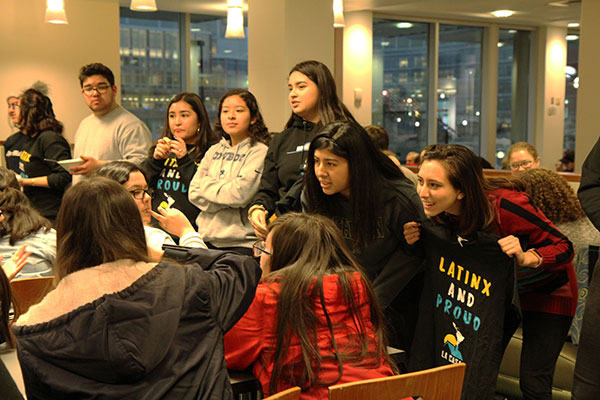
The primary focus of Year Four was deepening CEO’s work in southwest Detroit, an effort that involved multiple action items and CEO programs. This strategy, which had a significant impact on the student experience, showcases how the integration of programs within a unit can maximize its output and achievements. As a first step, CEO placed two Michigan College Advising Corps (MCAC) advisers at two new schools—Western International and Cesar Chavez Academy High School—thereby creating our first schools partnership within the Detroit Public Schools Community District (DPSCD). We also used elements from our College Day Program to form collaborations with Cesar Chavez Middle School and High School in recruitment and outreach activities. Both schools participated in our Campus Visits program and attended campus cultural events. In addition, the Wolverine Express program coordinated two visits to both high schools in which faculty members shared their journeys and inspired students in their search for college opportunities and pathways. Throughout all these efforts, our team worked closely with the Michigan Hispanic Collaborative, initiating a bi-directional partnership to connect families and students with opportunities and essential resources.
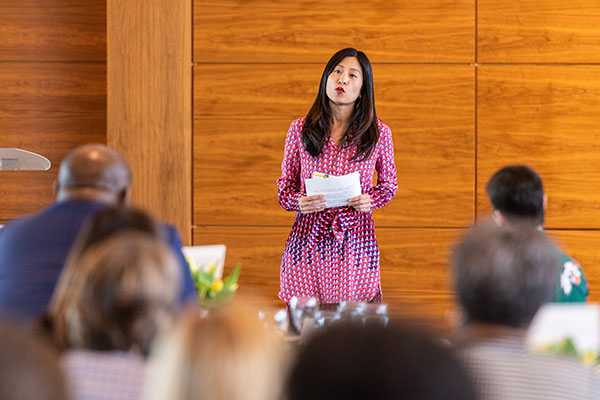
| Since 2017, LSA has successfully recruited 37 Collegiate Fellows (with a total of 3,376 received applications to date), including fellows who joined us in Fall 2020. We have recruited fellows in 22 different departments within all three divisions of Natural Science, Social Science and Humanities. Of these 37 Fellows, 15 are in tenure-track faculty positions as of Fall 2020, 17 have accepted tenure-track offers to follow their fellowship period and four other Fellows will be evaluated for tenure track in the coming year. During Year Four, we also made changes to allow departments greater flexibility in using the program to recruit accomplished scholars with a track record of engaging DEI knowledge, skills and competencies in their research, teaching and mentoring, and/or service and engagement. We have also enhanced institutional support for Fellows’ professional development and sense of community. Already, Fellows have made significant scholarly and pedagogical contributions to their departments and college communities and to their disciplinary fields, along with contributions to conversations both on campus and nationally for addressing equity and social justice issues in higher education. |

The Office for Health Equity and Inclusion held its inaugural Health Equity Leadership Weekend on August 9 and 10, 2019. In keeping with its theme of Becoming a Change Agent in Health Equity, the event was designed to further the development of emerging healthcare leaders in diversity, equity and inclusion.
Over 40 students participated in a weekend packed with activities. Dr. Joneigh Khaldun, Chief Medical Executive and Chief Deputy Director for Health for the State of Michigan Department of Health and Human Services, presented the keynote address: “Six Things every Clinician Should Know about Medicine, Leadership and Advocacy.”
The following day, students attended lectures and workshops that took a deeper dive into health care’s most pressing issues. Dr. Camara Jones, family physician and epidemiologist, whose work focuses on naming, measuring and addressing the impact of racism on the health and well-being of the country, charged participants to combat racial disparities in healthcare during her session, Naming Racism: A Gardener’s Tale.
Additional workshop topics included health and health care disparities; levels of health intervention; institutional change; how health care disparities affect different groups; resilience; tools to achieve health equity; microaggression; and racism. As intended, this highly successful learning experience laid a strong foundation for the ongoing education of next-generation health care leaders.
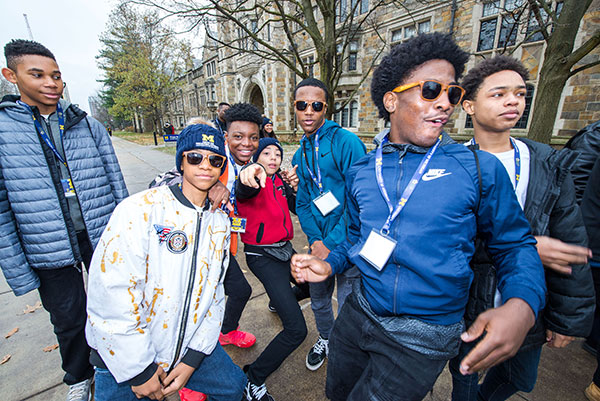
In Year Four, MOEP achieved its DEI-related goal of increasing both its visibility accessibility at minority-majority high schools throughout Southeast Michigan. In particular, Lieutenant Khamaria Saadiq worked closely with high school counselors, teachers and students, making educational presentations that provided an overview of the program and encouraged students to seek out enrollment at the University of Michigan and the crosstown affiliated universities supported by our program. Her work has led to a substantial increase in the number of students from majority-minority high schools applying for the High School Scholarship Program, and thus, the likelihood of considering for funding more first generation/minority/low-income students at the University of Michigan and our crosstown affiliates.
First Lieutenant Kent Peaslee also conducted outreach with students at local minority-majority high schools throughout the region—sharing information, hosting exhibits and participating in recruiting events at venues ranging from the Detroit Public Safety School to Washtenaw Community College and metro Detroit high schools.
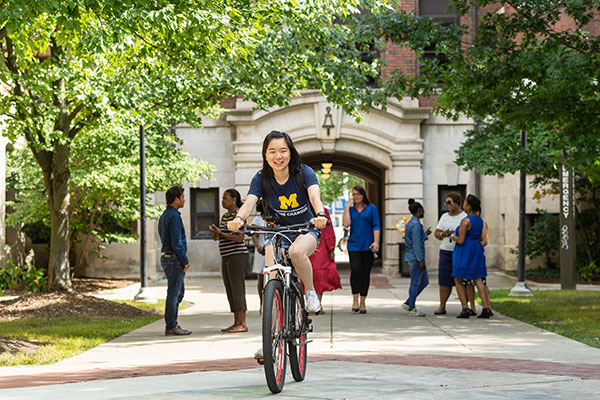
Two U-M schools eliminated the GRE from their application process to address testing equity disparities—increasingly noted in research literature and in evaluation of admissions decisions—with positive results.
Beginning in Fall 2019, with strong faculty support, SEAS removed the GRE requirement for its master's program. Following a close examination of student academic achievement patterns, the school had determined that there was no correlation between GRE scores and academic success. In removing the GRE requirement and waiving application fees, SEAS took a substantial step in expanding access and addressing equity disparities.
Also this past year, UMSI faculty voted to pilot removal of the GRE from PhD admissions consideration. A previous decision to remove the GRE from consideration in master’s admissions had resulted in an immediate increase in applications from underrepresented minority (URM)* students. In the 2019–2020 academic year, the number of URM PhD applicants more than doubled from the prior year (from 9 to 19 applicants). This is the largest number of PhD applicants from underrepresented groups in the last 11 years. The percent of URM-admitted PhD students also more than doubled from the previous year, from 5 percent in 2019 to 12 percent in 2020.
*URM (Underrepresented Minority) is a term used in college admissions. At the University of Michigan, URM refers to Black/African American, Hispanic/Latino/Latinx and Native American students
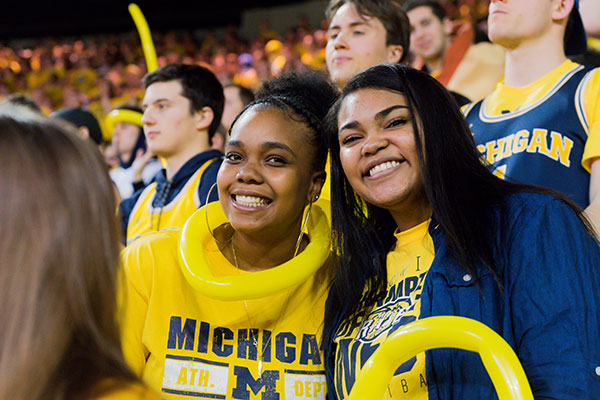
In Year Four, UMMA secured a $1 million endowment donation from Dr. Jiu-Hwa Lo Upshur (AM ‘61, PhD ‘72) to fund paid student internships at the museum. This gift, along with a $1 million endowment donation for internships and exhibitions from Erica Gervais Pappendick (AB ‘91) and Ted Pappendick, will ensure that all UMMA student interns are paid—a key FY20 action item for the museum, and an important step in expanding access to experiential learning experiences for a diverse group of students.
As former alumnae, both donors support this essential effort to not only provide U-M students with opportunities to engage with extraordinary art but also to encourage them to pursue careers in the arts. Energized by the June 2019 Association of Art Museum Directors (AAMD) resolution encouraging museums to end unpaid internship programs, these supporters are deeply committed to developing museum careers and appreciate that the arts often lag behind other academic concentrations in paid employment.
As Upshur noted, “The cost of education has increased significantly since my time as a student. I want to give students the opportunity to find meaningful internships that will build a career in the arts and museums, regardless of their financial position.”